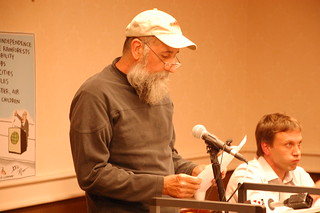Reminder: Send comments to the US EPA by this Thursday, June 21st
 If you haven't done so already, be sure to make your voice heard this week in support of clean water and full enforcement of the laws that protect our health and environment from corporate polluters.
If you haven't done so already, be sure to make your voice heard this week in support of clean water and full enforcement of the laws that protect our health and environment from corporate polluters.
Thursday, June 21 is the last day to send written comments to the U.S. Environmental Protection Agency (EPA) asking the agency to affirm its earlier objections to 36 coal-related water pollution permits.
Governor Beshear and the Kentucky Division of Water want to issue these permits even though they clearly fail to comply with the Clean Water Act. The EPA must hold the line and do its job to protect our health and water.
What happened at the Frankfort hearing?
Kentuckians spoke in favor of clean water and healthy communities at an EPA hearing in Frankfort on June 5. Read our blog post about it here.
Brief, personal messages have power!
You can email your comments to [email protected]. Put "Docket ID: EPA-HQ-OW-2012-0315" in the subject line. Or mail your comments to Water Docket ID: EPA-HQ-OW-2012-0315, US EPA, Mail Code 2822-1T, 1200 Pennsylvania Ave, NW, Washington DC 20460.
Below are some key facts Kentuckians should know going into this hearing. For a full set of talking points and background information, click here.
-
It is time for transition in Kentucky and Central Appalachia. As Kentuckians, we call for a just economic transition for coal workers and communities and an end to the destruction of our land, water and people caused by surface coal mining.
-
The health of Kentuckians living near surface mining operations is significantly at risk. The rate of children born with birth defects is 42% higher in areas with mountaintop removal mining, compared to nearby non-mining communities. People living in mining communities also suffer higher rates of cancer, chronic heart, lung and kidney disease, and mortality.
-
Kentucky's approach to permitting water pollution for coal mining operations is fatally flawed and does not comply with state and federal law. Kentucky's Division of Water does not properly evaluate whether a mining operation has a "reasonable potential" to generate discharges high in conductivity, total dissolved solids or metals that would violate water quality standards. The state's water pollution permits lack enforceable, chemical-specific limits. The state permits rely on unenforceable practices and biological monitoring that are not sufficient to protect water quality.
-
The Beshear administration continues to act as if its primary role is to issue pollution permits and shield coal companies from the law. Kentucky's Division of Water has used a simplified process to authorize water pollution from more than 2,500 coal operations since 2009. The state has joined a lawsuit against the EPA over its approach to Clean Water Act enforcement. And Governor Beshear's Energy and Environment Cabinet has gone to court repeatedly (and unsuccessfully) to prevent citizens groups from challenging its weak enforcement efforts.
-
The EPA must hold the line and affirm its objections to water pollution permits that do not comply with the Clean Water Act. The EPA's objections are supported by overwhelming scientific evidence about the relationship between surface mining and harm to water quality. In fact, the EPA should go further and take over all Clean Water Act permitting and enforcement in Kentucky.
-
Kentucky's coal industry and political leaders must stop peddling fear and falsehoods. Coal production in Central Appalachia has been declining steadily since the early 1990s. This is a long-term trend, which is accelerating as a result of economic and geologic conditions. Efforts by the U.S. EPA to protect our health are not the cause. Shielding companies from the Clean Water Act is not the solution.
Thanks for taking action!
Recent News
Kentucky’s past legislative session showed alarming trend toward government secrecy
Churchill Downs takes more than it gives. That's why the Kentucky Derby is a no-go for me
‘We must never forget.’ Kentucky town installs markers for lynching victims.
Featured Posts
Protecting the Earth
TJC Rolling Out The Vote Tour – a KFTC Reflection Essay
KFTC Voter Empowerment Contractor Reflection Essay
Archives
- Home
- |
- Sitemap
- |
- Get Involved
- |
- Privacy Policy
- |
- Press
- |
- About
- |
- Bill Tracker
- |
- Contact
- |
- Links
- |
- RSS


Add new comment